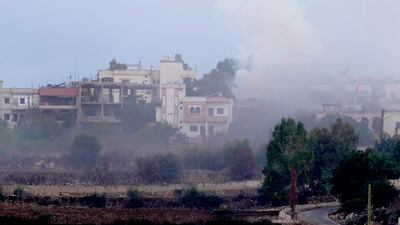Live updates: Follow the latest news on Israel-Gaza
“This is proof of what they've done to us,” Jamil Salameh, 56, said while standing before the Memorial of the Qana massacre.
The southern village in Lebanon was the site of an attack by the Israeli army that killed 106 civilians who had sought refuge in a Fijian UN peacekeepers' compound in 1996.
The Memorial is right in front of what was once the UN Interim Force in Lebanon base, where the destroyed buildings, including a church, have never been rebuilt.
“I've seen Israel’s crimes with my own eyes; there is no better witness,” said Mr Salameh, who is now responsible for the Memorial.
In south Lebanon, where Iran-backed militia Hezbollah wields significant power, the attitude is in stark contrast to most parts of the country when it comes to the continuing deadly clashes at the Israel-Lebanon border.
Many Lebanese fear that the Hamas-Israel war, which started last Saturday when the Palestinian militant group launched an attack into Israeli territory, would spill into Lebanon.
The skirmishes between Israel and Hezbollah, along with Palestinian factions, have already killed dozens, including civilians.
But in the south of Lebanon, where generations have been raised amid the sound of Israeli bombs, war is already a familiar reality.
Qana, particularly, is a town scarred by two tragic events – the bombing and an Israeli air strike in 2006 that claimed the lives of 56 people, most of whom were children, during the month-long war between Israel and Hezbollah.
This has instilled in many a strong desire for revenge, a commitment to defending the land and a deep-seated hatred for the enemy, also fuelled by political propaganda from the political parties.
In the village, the prevalence of flags from the Amal Movement, a Hezbollah ally, and the prominent portraits of its leader, Speaker Nabih Berri, hung on walls inside the Memorial leave little doubt about who holds sway in the village.
For Mr Salameh, the 1996 massacre that happened during Operation Grapes of Wrath, a 17-day campaign of the Israeli army against Hezbollah, are seen as part of a continuum with current events.
“They are using the same methods they've used against us in Gaza right now,” he said.
Almost three decades later, Mr Salameh cannot forget what he saw.
“It was a Thursday, at 2pm," he said. "People had sheltered in the Unifil compound after they heard shelling.
"I remember the kids were playing. Israel choose to bomb the safest place, several times.
“There was blood and body parts all over.”
Mr Salameh showed dozens of pictures hung on a wall displaying graphic images of the victims, including children.
While he survived the attack, he said that he lost 21 members of his extended family that day.
“In the south, there is no house without a martyr. It is in our DNA,” he said.
For now, Qana is spared from the continuing conflict.
On Tuesday, occasional bombings could be heard from exchanges of heavy fire occurring a bit closer to the border, amid reports of rocket and missile exchanges, resulting in the death of five Hezbollah members.
“If they want a war, we will retaliate,” said Hussein, 22, a resident of Qana who was dressed entirely in black, the trademark uniform of the Amal party militants.
No one will dissuade him, he said.
“My mother is the first to encourage me," Hussein said. "She lost her sister in 2006.”
Yet outside the south, testimonies would be very different.
Lebanon is deeply polarised between a pro-Hezbollah camp and an anti-Hezbollah camp, which denounces the militia as a proxy serving Iran's agenda rather than Lebanon's interests.
Some also blame Hezbollah for potentially dragging Lebanon into a bloody conflict that would knock down the country, already struggling with one of the worst economic crises in modern history.
“They have not experienced what we have, that's why,” Hussein said.
The cycle of violence seems far from coming to an end.

